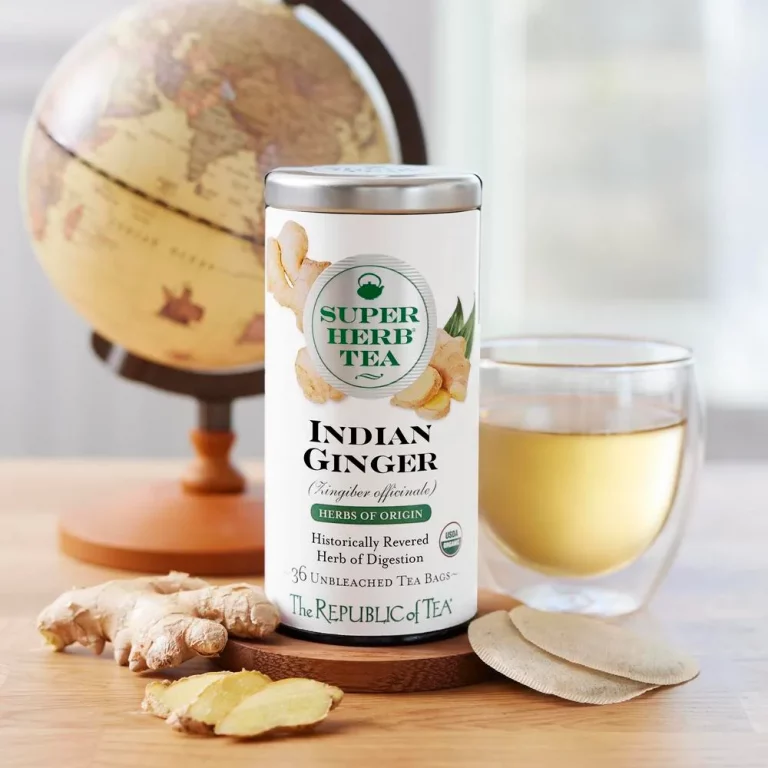Check out my #1 recommended ginger tea!
Learn MoreStruggling with a nagging cough?
Ginger tea might be the soothing remedy you’ve been searching for.
In this article, we’ll explore 5 reasons ginger tea is a must-try for cough relief.
Ginger can provide some much-needed comfort, whether it’s a dry cough or something more persistent.
Let’s dive into why ginger tea should be your go-to solution!
Table of Contents
1. Ginger Tea Soothes Your Throat
Overview:
Ginger tea is known for its soothing effects on an irritated throat. If you’ve been coughing a lot, ginger’s natural properties can calm your throat and help reduce the discomfort.
How it Works:
A sore throat can feel like sandpaper every time you swallow, leaving you uncomfortable and irritated.
Ginger tea acts like a soothing balm, coating your throat and easing that scratchy, raw sensation.
Ginger’s natural anti-inflammatory and antimicrobial properties help reduce swelling and fight off bacteria or viruses.
The warmth of the tea also promotes better blood flow to the area, speeding up healing.
With its comforting heat and medicinal properties, a cup of ginger tea can quickly turn a sore throat into a much more manageable annoyance.
Scientific Backing:
Research has shown that ginger has anti-inflammatory and analgesic properties, which help reduce throat inflammation and soothe soreness.
This makes it effective in providing quick relief from coughing and throat discomfort.
Don’t have time to peel fresh ginger or boil water? Try this Premium 120 Ginger Tea Bags. What I like about it is that not only was it made with 100% natural and pure ginger roots, but it’s also vegan and sugar-free, in addition to being soy-free, caffeine-free, and gluten-free. What’s more, the tea bags are made of natural corn fiber, which makes them biodegradable and friendly for the environment.
2. Ginger Tea Acts as a Natural Antioxidant
Overview:
Ginger is packed with antioxidants, which help fight off harmful toxins in your body that could make your cough worse.
How it Works:
Coughing can leave your throat feeling raw and your body drained, especially if it’s caused by irritation or infection.
Ginger tea acts as a natural antioxidant, helping to fight off harmful free radicals that can worsen inflammation and irritation in your respiratory system.
The antioxidants in ginger, such as gingerols, work to soothe the throat and reduce inflammation.
This not only helps calm persistent coughing but also aids in repairing damaged tissues.
A warm cup of ginger tea is like a gentle reset for your throat, offering relief while boosting your body’s defenses against further irritation.
Scientific Backing:
Studies have shown that ginger contains bioactive compounds like gingerol, which are antioxidants that help reduce oxidative stress.
This can support your immune system and prevent further irritation in your throat.
3. Ginger Tea Can Boosts Your Immune System
Overview:
If your cough is due to a cold or other infection, ginger tea helps by giving your immune system a boost.
How it Works:
Ginger tea is like a cheerleader for your immune system, encouraging it to work harder and faster to fight off any germs that might be causing your cough.
It steps in as a natural ally, giving your immune system the boost it needs to recover faster.
Packed with antioxidants and anti-inflammatory compounds, ginger helps strengthen your body’s defenses by combating free radicals and reducing inflammation.
Drinking ginger tea while coughing is like fueling your body’s internal army, helping it fight off infections and soothe your symptoms at the same time.
Scientific Backing:
A 2019 study found that ginger extract can boost immune function while potentially reducing inflammatory responses.
4. Ginger Tea Reduces Coughing Fits
Overview:
Persistent coughing can be exhausting and frustrating.
Ginger tea works to relax your airways and prevent those uncontrollable coughing fits.
How it Works:
Coughing fits can feel like an unstoppable storm, leaving your throat sore and your body exhausted.
Ginger tea works as a natural remedy to calm this storm, reducing the intensity and frequency of coughing fits.
Check out my #1 recommended ginger tea!
Learn MoreGinger contains compounds like gingerols and shogaols, which have natural anti-inflammatory and antispasmodic properties.
These help relax the muscles in your airways, easing the urge to cough.
The warmth of ginger tea also soothes throat irritation, providing immediate relief.
A cup of ginger tea is like pressing pause on a coughing fit, helping you breathe more easily and feel more at ease.
Scientific Backing:
A journal published in the American Journal of Respiratory Cell and Molecular Biology found that ginger may help reduce coughing fits through its bronchodilatory effects and regulation of calcium levels in airway smooth muscle.
5. Ginger Tea Is A Natural Remedy With Fewer Side Effects
Overview
Unlike over-the-counter medications, ginger tea is a natural remedy with fewer side effects, especially when consumed in moderation.
However, it can still cause some mild side effects, such as heartburn, diarrhea, stomach upset, and mouth irritation.
Scientific Backing
According to Leigh Ann Anderson, PharmD, ginger can interact with over 60 different medicines.
Some of these include blood thinners like warfarin and aspirin, as well as pain medications such as morphine.
Furthermore, a systemic review from the Food Science & Nutrition journal found that ginger can sometimes cause mild side effects, but this doesn’t happen very often.
If someone eats more than 5 grams of ginger a day, they might experience side effects like heartburn, diarrhea, or stomach discomfort.
So before using ginger tea as a home remedy, you must talk to your doctor to determine the safe amount or dose for you and your health.
Considerations
Before you drink ginger tea, here are some things to think about:
- Talk to your doctor if you have any of these conditions: a bleeding disorder, diabetes, high blood pressure, or if you take medications that thin your blood.
- Ginger can also react with other herbs or supplements you might be using. So do your research beforehand to avoid unwanted outcomes.
- If you have certain stomach issues called inflammatory or erosive-ulcerative lesions, avoiding ginger tea completely is advised since it may aggravate the stomach lining, which is already injured.
And if you find ginger tea too spicy for your taste, you can use less ginger or sweeten it with a natural sweetener like stevia or honey instead of sugar.
How to Make Ginger Tea for Cough Relief (Lemon Ginger Tea Recipe)
Lemon ginger tea is an amazing variation that combines the power of ginger with the immune-boosting effects of lemon.
The vitamin C from lemon can give your immune system an extra boost, while the ginger continues to calm your cough and throat.
You can read the basic recipe here.
Best Ginger Tea Combinations for Cough Relief
When you combine certain things with ginger, you’ll get yourself an effective home remedy for cough.
Some of them are:
1. Honey with Ginger for Cough
Combining honey and ginger creates a powerful remedy.
By lessening inflammation, honey coats and calms your throat. In addition to its antimicrobial qualities, honey’s sweetness can soothe the nerve endings in your throat and lessen coughing.
How to use: Add 1 tablespoon of honey to your warm ginger tea and drink slowly.
2. Ginger Lemon Honey for Cough
Lemon is rich in vitamin C, lemon helps boost the immune system, and its natural acidity aids in breaking down mucus, relieving congestion.
How to use: Add fresh lemon juice and honey to your ginger tea for a refreshing and effective cough remedy.
Ginger Tea for Cough with Phlegm
For wet coughs with phlegm, ginger tea can help break down mucus and clear airways.
You can add black pepper or cinnamon to your ginger tea for extra decongestant effects.
Can Ginger Tea Cure Cough Completely?
While ginger tea for cough can provide significant relief, it is not a cure.
If your cough is caused by an infection, allergies, or other medical conditions, it’s best to consult a doctor.
However, regularly drinking ginger root tea for cough can help ease symptoms and speed up recovery.
Conclusion
While ginger may not be a complete cure, it can certainly help relieve symptoms.
With the right combination of honey, lemon, and ginger, you can find relief from throat irritation, congestion, and coughing.
Try these remedies and see how they work for you!
Check out my #1 recommended ginger tea!
Learn MoreThis is for informational purposes only. For medical advice or diagnosis, consult a professional.







